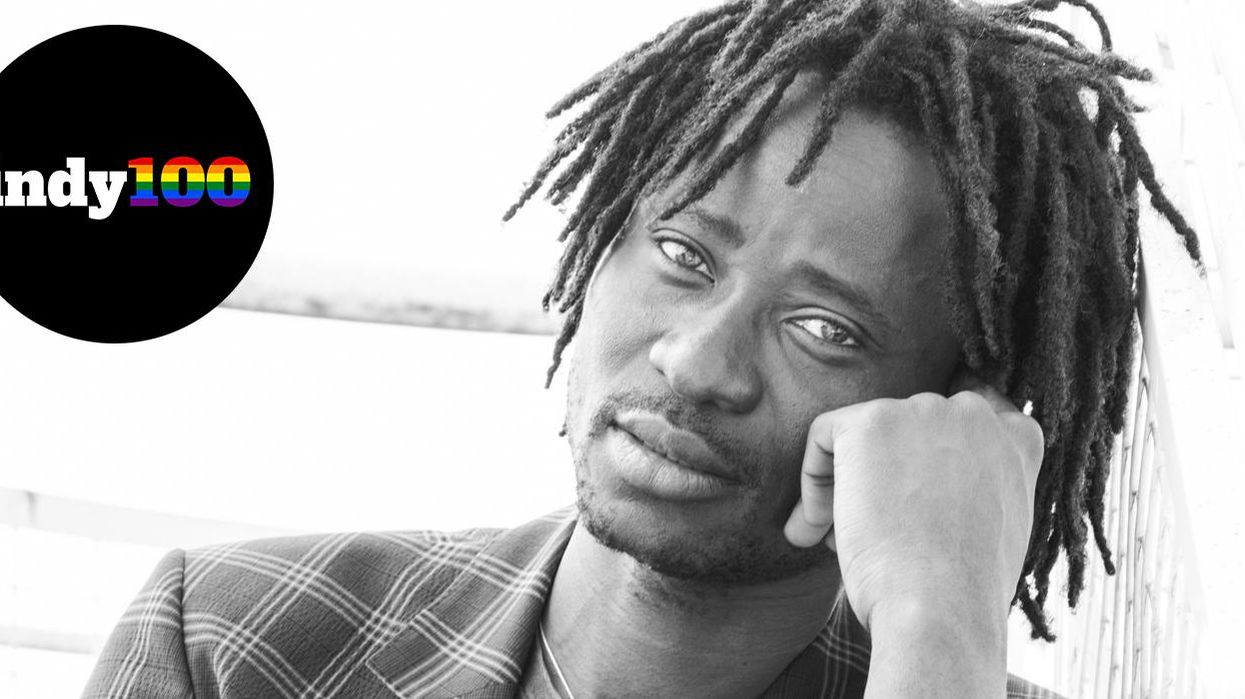Celebrities
Ryan Butcher
Jan 31, 2018

Picture: Issa Yazji
Throughout February, to celebrate LGBT+ History Month, indy100 will be profiling a major LGBT+ campaigner, activist or voice – past or present – working tirelessly to make things better for the community. As the theme of this year's LGBT+ History Month is Mapping the World, we're looking for people from outside of the UK, making changes in places where the LGBT+ community don't have the same rights and freedoms as they do here at home. Tell us who you think we should profile in the comments below.
When we thank someone for "speaking their truth", we're thanking them for broadening minds and empowering the disadvantaged by sharing their lived experiences with us.
And one of the people speaking their truth day in and day out is 42-year-old Nigerian HIV and LGBT+ rights activist Bisi Alimi, because the path he is continuing to tread is an inspiration to all of us.
Born in Lagos, Nigeria, Bisi made history when he became the first person to come out on Nigerian TV in 2004 – an event, he tells indy100, started a chain of events to bring him to where he is today.
He was working as an actor on a major Nigerian soap opera at the time and was under constant threat from the media for having his sexuality exposed, so scheduled an appearance on the New Dawn with Fumni Iyanda talk show on the Nigerian Television Authority.
It was principally for me to just be on control of the narrative. I wanted people to know that the actor they saw on TV, who they'd come to admire because of the character he was playing, was a gay guy.
New Dawn with Fumni Iyanda was one of the biggest TV shows in Nigeria and the first thing that happened after I came out was it was pulled off the air.
On my show, my character was killed off and nobody gave me a script again. I became broke and started enduring three years of intensive assault.
Before I did what I did, the president of Nigeria was saying, 'There are no gays in this country!' And this crazy boy went on TV with his sparkle shoes and said, 'Ah, excuse me! There's one here!'
While his appearance on New Dawn effectively ended his career as an actor, Bisi threw himself into activism work in Nigeria, specifically working with HIV organisations to teach gay men about HIV and how to have safer sex.
But the profile Bisi was developing and the name he was making for himself inevitably attracted trouble at home in Nigeria. In 2007, he was forced to fleet the country after a gang of men broke into the home he shared with his boyfriend, stripped the pair of them naked, tied them up and tortured them for two hours.
They were only saved after a knock on the door by a neighbour spooked their attackers, and it was Nigerian police authorities who advised that Bisi's best chance for survival was to leave the country.
Two days after the attack, he was in London with just £20 in his pocket and a sofa to sleep on at his Evangelical homophobic aunt's house, who every day would tell Bisi he was going to burn in hell.
While working to seek asylum, which was granted in 2009, he continued with his activism, working with with Naz Project, which helps black Africans who are diagnosed with HIV.
He would go on to study at university for his masters in political science, co-found The Kaleidoscope Trust, which works to uphold the human rights of LGBT+ people internationally, and even start The Bisi Alimi Foundation, which fights for the rights and dignity of LGBT+ people and is working to overturn the anti-gay law in the country that he feels directly responsible for.
Bisi believes that it was his coming out on New Dawn in 2004 that set the wheels in motion for the country's anti-gay bill, which was presented to the Nigerian National Assembly three times between 2006 and 2011, before finally being signed into law by President Goodluck Jonathan in 2014.
He tells indy100:
I look back and feel responsible for this law, and so I've taken it upon myself to make sure that it is only death that will stop me from overturning it.
The problem that I have and the joke that I have to live with is that I gave these gay boys in Nigeria false hope, and that for me is one of the many things that I'm angry about myself for.
I have people on Facebook and Instagram sending me messages every day, thanking me for what I did, because it made them realise they could be themselves.
But what happens next? The story didn't end well for me in Nigeria and there's no hope for them. I think maybe if I hadn't done it, I wouldn't have created the illusion that hope is possible.
Same-sex sexual activity is currently illegal in Nigeria – punishable by death in some states and up to 14 years in prison in others. There are no anti-discrimination laws to protect LGBT+ citizens and there is no legal right to change gender.
But by the time Bisi is through, these archaic and abhorrent laws discriminating against tens of thousands of LGBT+ people in the country will soon be a thing of the past. It is, after all, the mission he has dedicated his life to.
LGBT History Month is an initiative from the charity Schools OUT UK and aims to promote equality and diversity throughout the entire month of February for the betterment of everyone. Click here for more information, resources, events taking place throughout the month or to find out how you can help.
The Bisi Alimi Foundation is continuing to fight for the dignity and rights of LGBT+ people in Nigeria. Click here to find out more or click here to check out Bisi on Twitter.
More: 9 LGBT+ people who defined and defied in 2017
More: We asked 14 trans activists how cis people can be better allies in 2018
Top 100
The Conversation (0)












